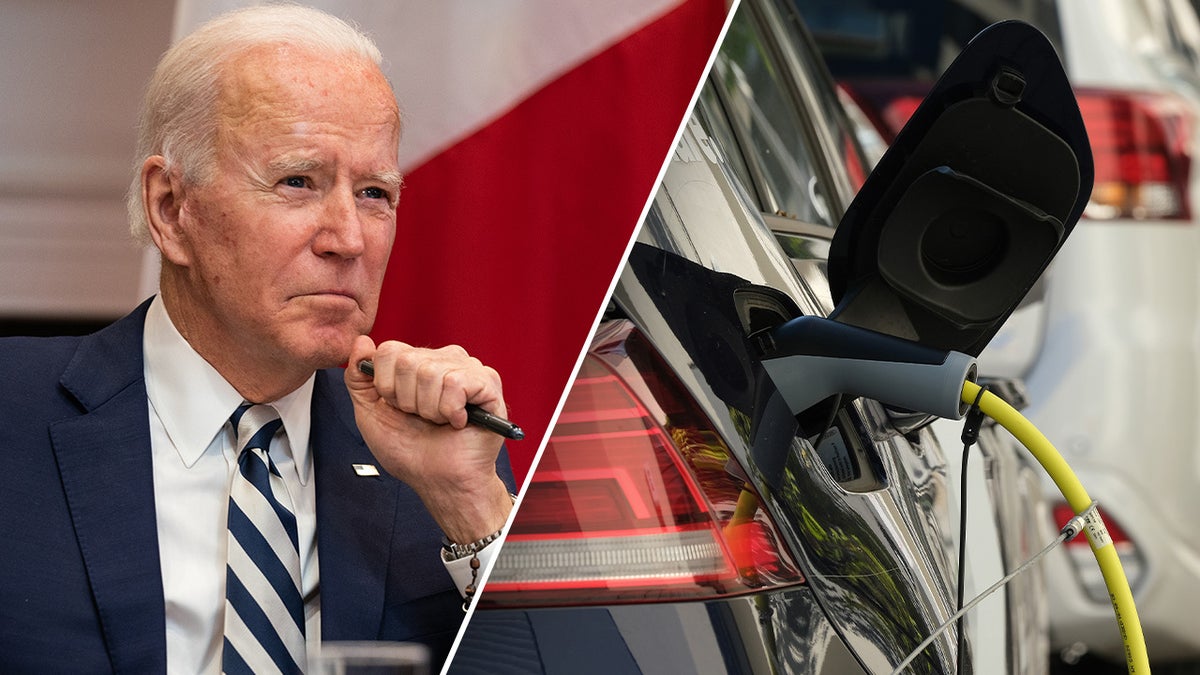The Ongoing Battle: Car Dealers Versus EV Mandates

Table of Contents
The Dealers' Perspective: Challenges and Concerns
Car dealerships face numerous hurdles in adapting to a predominantly electric vehicle future. These challenges impact their profitability, operational efficiency, and ability to effectively serve their customers.
Inventory and Infrastructure
The transition to EV sales requires significant upfront investment and logistical changes for dealerships.
- High initial investment in EV charging infrastructure: Installing and maintaining charging stations represents a substantial capital expenditure, especially for smaller dealerships.
- Lack of EV model diversity impacting customer choice: Limited EV models compared to gasoline-powered vehicles can restrict customer choice and potentially lower sales volume.
- Storage space limitations for EVs: EVs often require more storage space than comparable gasoline vehicles due to charging needs and potential for specialized maintenance areas.
- Specialized training needs for staff: Sales staff need extensive training on EV technology, charging infrastructure, and addressing customer concerns about range anxiety and battery life.
These financial burdens and logistical hurdles significantly impact a dealership's ability to smoothly transition to an EV-centric model. The cost of upgrading facilities, coupled with the uncertainty surrounding EV market growth, creates significant risk.
Sales Training and Customer Education
Effective EV sales require specialized training and overcoming customer apprehension.
- Addressing customer concerns about range anxiety, charging times, and battery life: Sales staff must confidently address common customer misconceptions and highlight the benefits of EV ownership, such as lower running costs and reduced environmental impact.
- Training on the technical aspects of EVs: Understanding battery technology, charging methods, and maintenance requirements is crucial for effective sales and customer service.
- Demonstrating the benefits of EV ownership: Highlighting the financial savings, environmental advantages, and performance capabilities of EVs is essential to drive demand.
Educating customers about the realities of EV ownership is crucial to overcoming resistance and driving market adoption. This requires a significant investment in training and ongoing support for sales teams.
Profitability and Margins
Dealerships also express concerns about the potential for lower profit margins with EVs.
- Lower service revenue from EVs (less frequent maintenance): Electric vehicles require less frequent maintenance than gasoline-powered cars, impacting the dealership's service department revenue.
- Competition from direct-to-consumer EV brands: Established automakers and new entrants are bypassing traditional dealerships, creating additional competitive pressure.
- Potential for government regulations impacting profit: Government mandates and regulations could further squeeze profit margins, making it harder for dealerships to remain financially viable.
The lower profit margins associated with EVs, combined with increased infrastructure costs, raise serious questions about the long-term viability of dealerships in the electric vehicle market.
The Argument for EV Mandates: Environmental and Public Health Benefits
Government mandates promoting EV adoption are driven by compelling environmental and public health concerns.
Reducing Greenhouse Gas Emissions
EVs play a vital role in mitigating climate change by significantly reducing greenhouse gas emissions.
- Quantify the impact of EV adoption on air quality and greenhouse gas reductions: Studies consistently show that widespread EV adoption can dramatically decrease carbon dioxide emissions and improve air quality. For example, the EPA cites significant reductions in greenhouse gas emissions per mile driven when compared to gasoline vehicles.
- Emphasize the environmental and public health benefits, including decreased respiratory illnesses and improved air quality: Cleaner air translates to fewer respiratory illnesses and improved public health outcomes, resulting in significant societal benefits.
The urgency of addressing climate change necessitates rapid decarbonization of the transportation sector, and EVs are a key component of that solution.
Energy Security and Independence
Transitioning to EVs offers potential benefits for national energy security.
- Highlight the shift towards renewable energy sources for charging EVs: The increasing use of renewable energy sources to power EV charging infrastructure contributes to a cleaner and more sustainable energy system.
- Discuss the economic benefits of domestic EV manufacturing and infrastructure: Investing in domestic EV manufacturing and infrastructure creates jobs and stimulates economic growth.
Reduced reliance on foreign oil and increased energy independence are significant benefits that align with broader national security goals.
Public Health and Economic Impacts
The long-term positive effects of widespread EV adoption extend beyond environmental concerns.
- Reduced healthcare costs associated with air pollution: Improved air quality due to fewer vehicle emissions leads to reduced healthcare costs associated with respiratory illnesses and other pollution-related health problems.
- Job creation in the EV sector: The transition to EVs creates numerous job opportunities in manufacturing, infrastructure development, and related industries.
- Economic growth associated with a thriving EV industry: A successful EV sector can drive significant economic growth and innovation.
The cumulative economic and public health benefits of widespread EV adoption are substantial and arguably outweigh the short-term challenges faced by dealerships.
Finding Common Ground: Collaboration and Solutions
Bridging the gap between dealerships' concerns and the goals of EV mandates requires collaboration and proactive solutions.
Government Support and Incentives
Government intervention can significantly aid dealerships in their transition.
- Government grants and subsidies: Financial assistance can offset the cost of installing charging infrastructure and training staff.
- Tax credits for EV infrastructure investment: Tax incentives can encourage investment in charging stations and other EV-related infrastructure.
- Training programs for dealership staff: Government-funded training programs can equip dealership employees with the skills needed to sell and service EVs effectively.
- Incentives for consumers purchasing EVs: Consumer incentives can increase demand for EVs, creating a more robust market for dealerships.
Government support is critical to ensuring a smooth and equitable transition to a predominantly electric vehicle market.
Industry Partnerships and Innovation
Collaboration across the automotive sector is essential for effective solutions.
- Development of innovative charging technologies: Advances in charging technology, such as faster charging speeds and wireless charging, can address customer concerns about range anxiety and charging times.
- Improved battery technology: Improvements in battery technology, such as increased range and reduced charging times, will further enhance the appeal of EVs.
- Streamlined sales and service processes: Efficient sales and service processes, tailored to the specific needs of EVs, can optimize dealership operations and improve customer satisfaction.
Industry-wide collaboration can drive innovation and develop solutions that address both the environmental imperative and the economic realities faced by car dealerships.
Conclusion
The debate surrounding Car Dealers Versus EV Mandates highlights a complex interplay between environmental goals and economic realities. While dealerships face valid challenges in adapting to the EV market, the environmental and public health benefits of widespread EV adoption are undeniable. Finding common ground requires a collaborative approach, with government support playing a crucial role in providing incentives and facilitating the transition. Industry partnerships and ongoing innovation are also vital to address the concerns of dealerships and ensure a successful transition to a sustainable transportation future. We encourage readers to engage in the discussion, learn more about EV mandates and their impact, and to continue following the ongoing battle of Car Dealers Versus EV Mandates to understand the future of the automotive industry.

Featured Posts
-
 Investigation Into Lingering Toxic Chemicals After Ohio Train Derailment
Apr 28, 2025
Investigation Into Lingering Toxic Chemicals After Ohio Train Derailment
Apr 28, 2025 -
 Espn Predicts A Surprising Red Sox Outfield For 2025
Apr 28, 2025
Espn Predicts A Surprising Red Sox Outfield For 2025
Apr 28, 2025 -
 Red Sox Roster Strategy Filling The Gap Left By Tyler O Neill In 2025
Apr 28, 2025
Red Sox Roster Strategy Filling The Gap Left By Tyler O Neill In 2025
Apr 28, 2025 -
 Hudsons Bay Liquidation Sale Up To 70 Off At Remaining Stores
Apr 28, 2025
Hudsons Bay Liquidation Sale Up To 70 Off At Remaining Stores
Apr 28, 2025 -
 Addressing The O Neill Void Red Sox Roster Moves For 2025
Apr 28, 2025
Addressing The O Neill Void Red Sox Roster Moves For 2025
Apr 28, 2025
Latest Posts
-
 Le Nouveau Couple D Eric Antoine Une Officialisation Sur M6 Apres Son Divorce
May 12, 2025
Le Nouveau Couple D Eric Antoine Une Officialisation Sur M6 Apres Son Divorce
May 12, 2025 -
 Eric Antoine Et Sa Compagne Apparition Remarquee A La Premiere Parisienne
May 12, 2025
Eric Antoine Et Sa Compagne Apparition Remarquee A La Premiere Parisienne
May 12, 2025 -
 Eric Antoine De M6 Officialise Sa Relation Apres Son Divorce
May 12, 2025
Eric Antoine De M6 Officialise Sa Relation Apres Son Divorce
May 12, 2025 -
 Nine Cardinals In The Running Potential Successors To Pope Francis
May 12, 2025
Nine Cardinals In The Running Potential Successors To Pope Francis
May 12, 2025 -
 The Next Pope Analyzing Nine Leading Contenders For The Papacy
May 12, 2025
The Next Pope Analyzing Nine Leading Contenders For The Papacy
May 12, 2025
